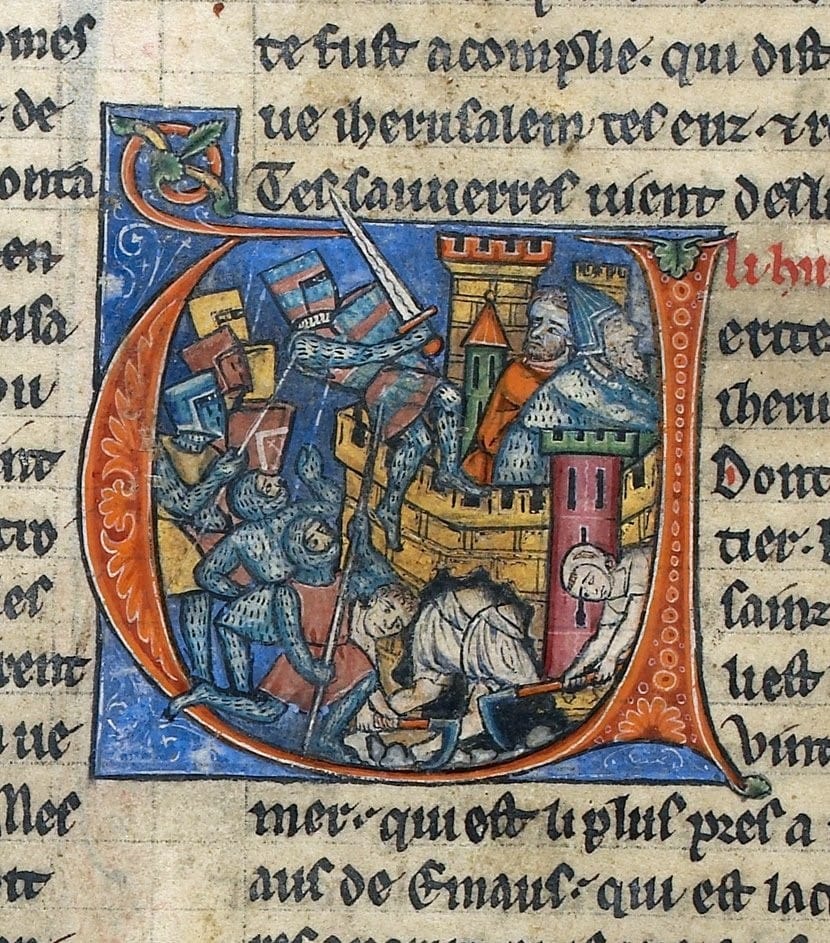mine / undermine

To undermine something is to destroy it through some surreptitious means, to subvert it, and undermine is one of those words whose etymology is readily apparent by examining its constituent elements, under + mine, originally a reference to the military tactic of digging under the walls of a fortification in order to collapse them.
The verb to mine dates to the early fourteenth century and comes from the Anglo-Norman verb miner, meaning to dig under something, such as a wall, in order to make it collapse. In English it quickly acquired an additional, more general sense of to dig, especially for minerals.
Here we see the verb phrase to mine under in the poem King Richard, which was probably written sometime before 1300 with a manuscript witness from c. 1330. The bulk of the poem appears in the Auchinleck Manuscript but is incomplete there. This portion is from a fragment in a manuscript in the Edinburgh University library:
Wiþ þat þe galeyes com to þe cite
& hadde neyȝe won entre
Þai hadde so mined vnder þe walle
Þat mani a griffoun gan doun falle.
(With that the galleys came to the city
& had nearly won entry
They had so mined under the walls
That many a siege tower began to fall down.)
But the verb to undermine itself is first recorded in its figurative sense in an account of the Passion of Christ in the South English Legendary, a medieval collection of saint’s lives. The manuscript in which it appears was copied prior to 1325 and the particular version was written around 1280:
Þat ȝif þe hosebonde wiste þe tyme & þe stounde
Whanne þe þeof wolde come wake he wolde ffor to him ffounde
And nolde him soffry nou3t his hous to vndermyne.
(If the husband knew the time and the moment when the thief would come, he would wake to find him. And he would not suffer his house to be undermined.)
The literal sense of digging under a fortification is recorded in a pre-1382 Wyclifite translation of the Bible, specifically Jeremiah 51:58:
These thingus seith the Lord God of ostus, The wal of babilon he the heist with vndermynyng shal ben vndermyned, and his heȝe ȝatus shul be brend with fyr.
(These things say the Lord God of hosts: the wall of Babylon, it is the highest, with undermining shall be undermined, and its high gates shall be burned with fire.)
The Vulgate version of this passage uses the verb suffodere, to dig under, to pierce from below. The fact that the figurative sense predates the literal means little. We just don’t have a surviving example of the literal usage that is older—when it comes to dating words from medieval manuscripts, differences of a few decades usually aren’t significant.
In English, the military senses of both undermine and mine existed throughout the medieval period, but in the early seventeenth century the verb to mine ceased being used in the military sense and came to only mean to dig, to excavate.
Modern landmines and sea-mines are also from the same linguistic root. Often, once a tunnel was dug underneath a castle’s walls, explosives, or mines, would be placed in it and detonated, bringing the walls down. The “breach” in the walls of Harfleur that Shakespeare’s Henry V charged “once more into” was created by just such a mine. This sense of mine eventually evolved into any buried or submerged explosive.
Knowing the etymology of this word has one additional advantage. If you’ve ever played the old board game Stratego and wondered what the miner was doing on the battlefield, now you know.
Sources:
Anglo-Norman Dictionary, 2012, s.v. miner1, v.
The Holy Bible, Containing the Old and New Testaments with the Apocryphal Books, in the Earliest English Versions Made from the Latin Vulgate by John Wychiffe and His Followers, vol. 3 of 4. Josiah Forshall and Frederic Madden, eds. Oxford: Oxford UP, 1901, Jeremiah 51:58, 467. HathiTrust Digital Archive.
King Richard, lines 309–12. Edinburgh University Library MS 218, E fol. 3vb.
Middle English Dictionary, 8 February 2025, s.v. minen, v., underminen, v.
Oxford English Dictionary, third edition, March 2002, s.v. mine, v.; second edition, 1989, s.v. undermine, v.
The Southern Passion. Beatrice Daw Brown, ed. Early English Text Society, O.S. 169. London: Oxford University Press, 1927, 525–27, 19. HathiTrust Digital Archive.
Image credit: London, British Library, Yates Thompson MS 12, fol. 40 v. Wikimedia Commons. Licensed under a Creative Commons Attribution-Share Alike 4.0 International license.